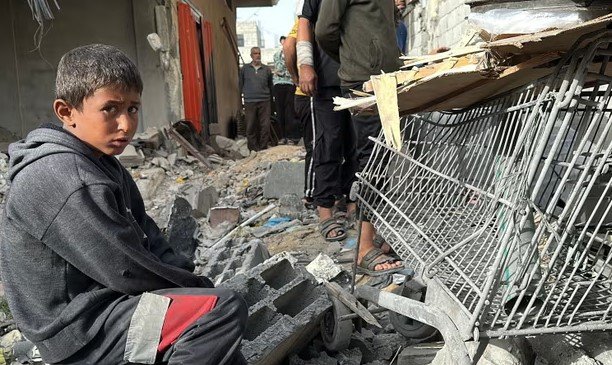Israel is facing legal scrutiny yet again with a new case brought forth by Russia and China at the International Court of Justice(ICJ) concerning the blockade and funding suspension of the United Nations Relief and Works Agency for Palestine Refugees (UNRWA). This case, put together by human rights advocacy groups, marks an eruption in growing concerns over Israel’s governance regarding the Gaza Strip.
The Hague this week witnessed the ICJ, popularly known as the UN’s supreme court, pass judgement on other states to observe and intervene if their jurisdiction is breached on humanitarian concerns of Palestinian refugees in Israel-controlled territories covering Gaza and Palestinian lands which encompass Gaza and Cishin. The case is laced with escalating violence in the said areas along with warnings from humanitarian agencies regarding the already worsening situation in Gaza, striding into a full-blown crisis.
UNRWA Controversies In Central Focus
Since its establishment in 1949, UNRWA has been engaged in the blundering of systems by trying to keep the people under its control, which involves Palestinian refugees in Gaza and the West Bank. However, Israeli accusations against the agency have maintained a hawkish policy, claiming that they foster military insurgents, which is vehemently countered by UNRWA.
Earlier this year, Israel imposed further restrictions on UNRWA’s functions and has since urged allied countries to cut funding following allegations that some of the agency’s staff were affiliated with Hamas. While these claims remain under investigation, Israel’s unilateral decision to restrict UNRWA’s operations held Gaza provoked strong condemnation from humanitarian bodies and UN officials who, as a matter of principle, believe that collective punishment of civilians is a violation of law.
Legal Arguments Presented
During the opening sessions in The Hague, legal counsels for the coalition of countries comprising South Africa, Ireland, and other Arab states charged that Israel had inflicted a blatant breach of its obligations under the Fourth Geneva Convention, which affords protection to civilians in times of armed conflict.
Dr. Amina El-Haddad, the lead counsel for the plaintiffs, said, “Israel’s policies towards UNRWA have in effect dismantled the single most important and almost the only remaining humanitarian relief lifeline for literally millions of Palestinians. This violates their rights and breaches international humanitarian law.”
El-Haddad made the case that Israel’s blockade increases the level of suffering in Gaza, where the vast humanitarian aid is provided by UNRWA. “While it is true that addressing security issues is the responsibility of the state, those considerations must happen within a framework of international legal obligations,” she added.
Israel’s legal team, however, defended the accusations, describing the blockade as a measure of security need and a legal response. “The State of Israel has an inherent right to defend its citizens against terrorist activities,” Stern argued. “Our actions are measured, focused, and tailored to the proposed threat.”

Global Responses
The global focus on the case is very intense. Amnesty International and Human Rights Watch, among other major NGOs, submitted amicus briefs supporting the case against Israel, asking that the ICJ sanction Israel for what they issued as “continuous infringements of the rights of the Palestinian people.”
UN Secretary General Antonio Guterres has also cautiously spoken out, noting the need to enable humanitarian organizations to conduct their work freely. In his address, he once again noted that “Politics should not interfere in the distribution of assistance. Humanitarian actors need to be given the safeguards necessary to perform their functions free from suffering, and as such, international law must protect their operations.”
Political reactions have provided less coverage. The US diplomats expressed concern over the claims, reiterating Washington’s unconditional backing of Israeli security. Some EU diplomats also appeared more divided, with some advocating for an independent probe while others calling for a wait on investigation results into UNRWA’s internal practices.
Gaza’s Humanitarian Crisis Worsens
As the court proceedings in The Hague commence, the Gaza conflict is increasingly becoming volatile. As escalating military activity continues throughout the region, food obstructions across Gaza’s borders provoke a panic-driven stampede towards supermarkets. This has now caused a rapid increase in burgeoning inflation, and starvation fears are higher than ever before.
A member of UNRWA’s governing body, Gaza Field Officer Sami al-Khatib, gave his sparse commentary amidst the increasing chaos across Gaza. “We face an incredible range of challenges as humanitarian access remains a lifeline. The situation will evolve into an uncontrollable disaster without administering immediate countermeasures,” stated al-Khatib to court reporters.
Nourishing medical supplies have also reached alarming new lows. After decades of relentless siege, some hospitals still bravely attempt to offer basic services, but a dangerous shortage of supplies may result in them having to close all non-essential functions indefinitely unless aid congestion is unblocked.
Broader Implications for Israel
Legal experts suggest that while the ICJ’s rulings are binding. Override the Enable Law. A violation of Israel’s sovereignty, however, a ruling against Israel might lead to further diplomatic erosion, loosening the already thin bonds with allied Empires who strongly oppose colonization and bayoneting in blatant violation of internationally accepted statutes of time, deriving gill plates of nineteen separate Ireland.
“There is a growing sense that the international community’s patience is wearing thin with Israel’s Gaza policies,” said Professor Louise Tremblay of the University of Montreal, a specialist in international law. “While immediate change seems unlikely, a court decision could make it easier for broader diplomatic pressure.”
Israel’s Future Strategy
As strained domestic politics and rising critiques from abroad prompted Israeli Prime Minister Benjamin Netanyahu to adopt a more aggressive stance, he did not hold back during a press briefing in Jerusalem. “You will not hear Israel apologizing for striking back. We will not accept any attempt to justify criminal activity undertaken in the defense of our citizens,” said Prime Minister Netanyahu.
Still, some Israeli officials expressed concerns privately regarding the legal ramifications of the case. Recent leaks indicate there are discussions within Israeli corridors of power over shifting policies concerning aid and other non-governmental entities in Palestinian-held areas.
Table of Contents
What Comes Next
The ICJ’s expectation is to hold sessions over the coming months before an advisory opinion or a binding ruling is made. With these developments, humanitarian groups, legal experts, and other states are expected to increase their demands, putting pressure.
No matter the result, the case highlights a dramatic shift in the multi-decadal Israeli–Palestinian conflict, which places the dire humanitarian needs of millions under international political and legal scrutiny.



